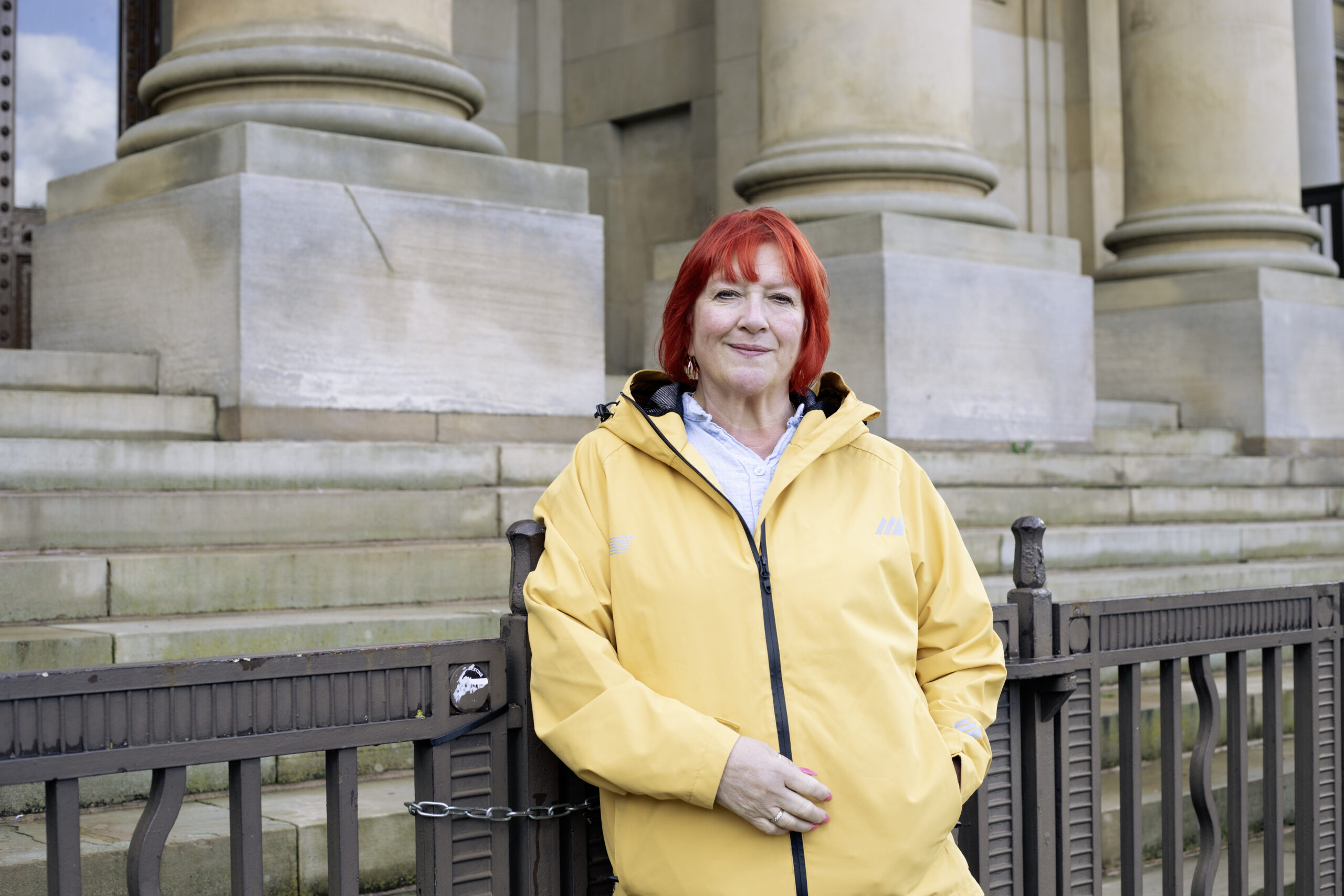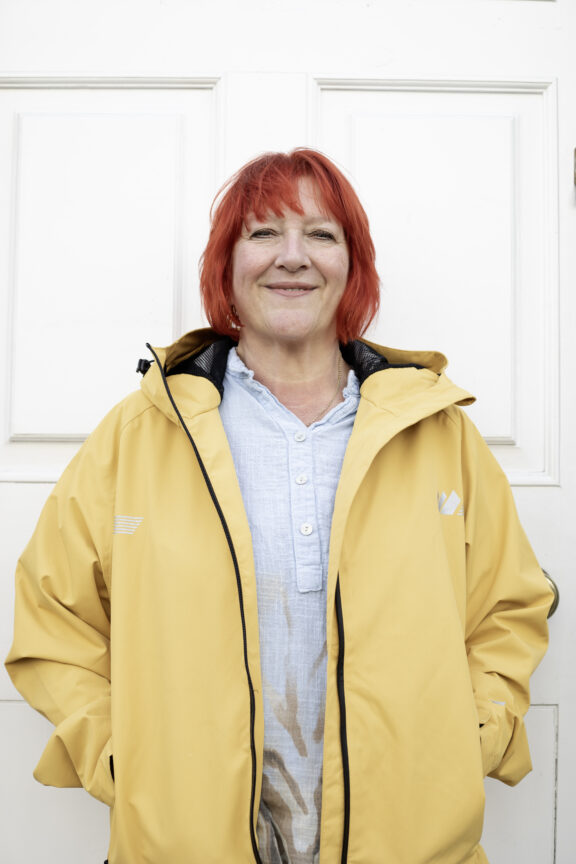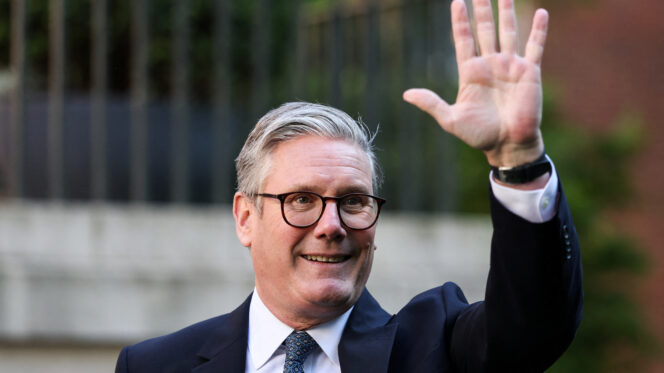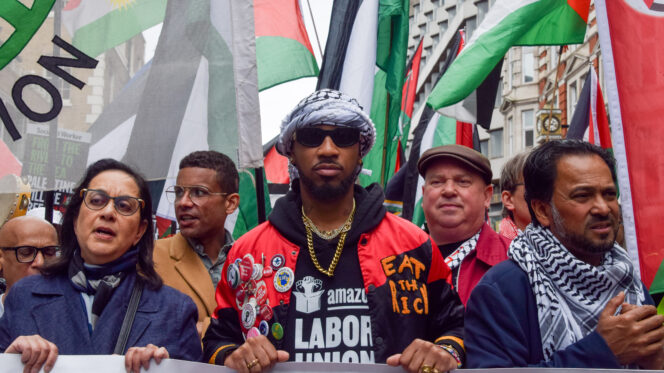Meet the Socialist Hoping to Lead Britain’s Biggest Trade Union

A record number of journalists applied to cover this year’s trades union congress, a normally humdrum annual meeting of 48 of Britain’s trade unions. Descending on a windy Brighton, they arrived with one question on their minds: who would be elected to replace Angela Rayner as deputy leader of the Labour party? But amidst chatter about rushed selections and backroom stitch-ups, another election with just as much, if not greater significance for the country flew under the radar: that of Unison general secretary.
With 1.3 million members, mostly in the public sector, Unison is the UK’s largest union. Yet its size hasn’t translated into public profile or industrial power (for comparison, the National Union of Rail, Maritime and Transport Workers, or RMT, represents 83,000 members). When an outburst of industrial action in 2022-23 brought the public into contact with a new generation of labour leaders with strident rhetoric – Sharon Graham, Mick Lynch, and Dave Ward – Christina McAnea, Unison’s current leader, was largely absent. And as workers in other unions downed tools, Unison repeatedly failed to secure enough votes to bring its members out on strike.
Andrea Egan thinks she knows why that is. “Our union has an income of nearly £200m. We do not use that money, that power, and those resources to be the union we should be,” said Egan. “And that’s on the leader.”
Ask people to picture a general secretary, and chances are they’ll imagine someone in the mould of Mick Lynch: white, male, bald and bombastic, or some combination of the four. Egan is very much a departure from that stereotype: with a fresh set of nails and a shock of red hair that she dyed herself, she’s softly spoken but direct. A social worker for over three decades, she has a calm but steely authority; I find it difficult to imagine her raising her voice. When we meet at Camden Town library, I compliment her hair colour. She quickly demurs, telling me she’s hoping a hairdresser will fix up her best attempt at a dye job: “I’ve spent my whole career looking after other people,” she laughs, “and I can hardly look after myself.”
We’re here to discuss Egan’s leadership bid. She’s hoping to become the first lay member – meaning someone without a paid union position – to lead Unison.
A Unison member for over 30 years, her ascent through the ranks has been relatively slow, going from shop steward in the 1980s to president – the most senior honorary official of the union – in 2022. Now secretary of Unison’s Bolton Metro branch, Egan tells me her profession has shaped her politics: “My trade union work is important to me, but my social work is equally important.”
That continued contact with the workplace has arguably helped to preserve Egan’s radicalism. If elected, she plans to put the union on a more confrontational footing not only with employers, but with the Labour party, with which the incumbent McAnea is closely allied. Her manifesto pledges to get the union “strike-ready” by supporting all branches in dispute; to launch a benchmarking exercise of successful industrial action from other unions; and to shift resources to ensure the union can run successful ballots.
Voting for the election closes on 25 November, with the results announced on 17 December. So far, it’s a three-horse race between McAnea, Egan, and the unknown Tina Farrelly.
Army brat to union organiser.
With a dad in the armed forces, Egan spent her early childhood abroad. Her parents divorced while the family was living in Germany; she moved to Bolton with her brother and mum. “We stayed with my grandparents until we could get a house. They had a typical 70s terraced house, with the old tin bath. Then we got our first council house.” Her mum worked odd jobs, often in catering (her dad eventually left the army and moved to Hull to join the police). “I was brought up by a single parent on a housing estate. None of us had anything, nothing. But we all looked out for each other.”
A school career advisor steered Egan towards social care, which she studied at college on a bursary from the council. After a year-long stint at an old people’s home, she started work as a children’s residential care worker.
“They were some of the most difficult kids in society, put in big homes, with usually only five or six staff, and you’d have to sleep over,” Egan said. “So there was always something going down, and we were always having the union in. Eventually, the branch secretary [an elected union representative for all workplaces covered by the branch], said, ‘I can’t keep coming here all the time. One of you has got to be a steward [a union member elected by their colleagues to represent them at work]. How about you, Andrea?’”
And so – aged just 22, though “mature for my age” – Egan became the union’s representative in the children’s home. At the time, she was flattered to have been singled out so young for a position of such responsibility. These days, she thinks about it differently: “It wasn’t because they saw something in me. It was because I was young,” she laughed. “I had no kids and family, so they thought it would be okay if something happened to me” (for example, if her employer took issue with her union work and found a reason to dismiss her).
How did she go from a diligent but inexperienced 22-year-old to standing for general secretary? “I think it just happens, doesn’t it? It’s not something [where] you think, ‘Oh, I want to do that.’” When pressed, she credits three women within the Bolton branch – Joan Pritchard Jones, Florence Hill and Bernie Gallagher – with encouraging her to take on other roles in the union. “I just worked my way up,” she said. In doing so, she discovered that leadership skills don’t necessarily require her to be the person talking.
“I learned that you’re not a rescuer. Your role is to build the confidence of members. If you go in and rescue a member, that might resolve that issue, but it leaves them vulnerable in that workplace. If the manager realises they’re prepared to stand up for themselves, they’re less likely to come back for more.”
But it was a decade of Conservative austerity and its direct attack on Unison’s many public sector members that produced Egan’s assertive negotiating style. “[Public bodies] were overloaded with [government] review after review,” she said. “My attitude was, if you sit back and do nothing, the council will just implement whatever the [review’s] proposals are. It is on the union to resist.”
From that moment on, Egan led her branch through battle after battle. In 2008, Egan led the union’s (unsuccessful) campaign against the academisation of Bolton secondary schools, including pupil walk-outs. When the Tory-Lib Dem coalition introduced the bedroom tax in 2013, she lent the union’s support to community organisations fighting the change in policy. When Bolton council tried to cut payment for sleep shifts from adult care residential workers’ sick pay and annual leave, she helped run the strike. She won that latter fight – but, she says, without help from Unison.

Bedevilled bureaucracy.
“Sometimes we felt we were either against the employer or the union.” She talks about the “dark side” of the union, and the use of disciplinary processes to target activists who don’t follow “how the bureaucrats want the union to run”.
John McDonnell, former shadow Labour chancellor and independent MP for Hayes and Harlington, agrees. A Unison member for 50 years, he describes the union as “bedevilled with bureaucratisation”. “We find time and time again where our members are demanding action, the bureaucracy will come in and do everything they possibly can to frustrate that action taking place,” he said.
“They’ll argue it’s saving the union money. But it’s really about just not wanting to be a union that takes action in that way. They want a quiet life, simple as that. The bureaucracy holds our members back. What Andrea has done is to release the power of a membership in different campaigns. It’s exactly what we need.”
Backing Egan for leader, he told me over the phone that he “cannot explain eloquently enough just how much she’s impressed me with her determination and courage.”
“I can remember a time when we had a Unison leadership that actually coordinated other trade unions across the movement to put pressure on the government to ensure that they delivered policies for working-class people. At one time, the general secretary of Unison was one of the most influential people in the country. That’s what Andrea could be.”
Egan is clearly tapping into frustration with the union’s bureaucracy, as well as its proximity to Starmer’s Labour, in her leadership bid.
“There’s a disconnect between the leadership and members,” Egan said. “That’s because they’re just not rooted in our lives. It doesn’t matter where they’ve come from. They’re suddenly in a different pay bracket and they live a different type of life.”
Egan has pledged to reject the general secretary’s £181,000 pay package, taking instead only the wage of a social worker. “When I challenge my own employer, the council, I point out the differentials between the highest and the lowest paid,” she said. “Taking that salary will keep me rooted.”
Egan’s pledges go beyond industrial issues: she’s promised to create a pensions divestment task force to secure the divestment of the local government pension scheme from firms supplying arms to Israel, or businesses involved with the exploitation of the occupied Palestinian territories. She’s vocal on her support for transgender members, promising them the “full support of the union” to live as their “true authentic selves.”
Then, we get to Starmer’s government. Since last July, challenges to Starmer’s leadership have come thick and fast: a new left party; the election of eco-populist Zack Polanski as leader of the Green party; and Reform’s spectacular performance in May’s local elections. Yet barring Unite’s Sharon Graham, who has been a vocal critic of Labour – going so far as to suspend then-deputy prime minister Rayner over her handling of the Birmingham bin workers’ strike – few of these challenges have come from the trade union movement.
Egan pauses before telling me how “bitterly disappointed” she’s been by Labour. Raised in a Labour-voting family, she now plans to renegotiate the union’s relationship to the party.
Labour and labour.
The union movement has an umbilical link to the Labour party, and has provided funds, activists, and a voting base since the party’s foundation. But their power within the party was radically diminished by Tony Blair’s new Labour government, with unions having their voting power at party conference cut, as well as their presence on the party’s NEC slashed. In 2004, the RMT became the first union in Labour’s history to be expelled, followed shortly by the disaffiliation of the Fire Brigades Union (FBU).
Nowadays, 11 trade unions are affiliated to the Labour party, including the left-leaning FBU, which rejoined under Corbyn. While relations between Starmer and the unions have been at times strained, he’s been broadly able to count on the support of three of the largest affiliated unions for funding and shoring up his control of internal party structures: UNISON, GMB and the Union of Shop, Distributive and Allied Workers (Usdaw). Egan’s election could shift the balance of power between Starmer and the unions.
Of all the affiliated unions, Unison is seen as closest to Starmer, donating £1.46m to the party during the 2024 general election. In June, McAnea congratulated Labour on its “momentous” first year in power. Several of the (former) Labour frontbench have close ties to the union: prior to her election as an MP, former deputy prime minister Angela Rayner was a Unison official, calling the union her “my family and my home”; Claire Stewart, No 10’s director of trade union relations, was previously a Unison organiser. Eight Labour MPs elected in 2024 were either Unison staff or activists.
Egan was expelled from the party in 2022 for sharing two articles from Socialist Appeal, a proscribed Marxist group, despite the group not having been proscribed when she shared the first article. She never received a response to her appeal.
“Somebody said to me in an interview, ‘Do you just want to embarrass the Labour party?’” she said. “The answer to that is no: I want to hold its feet to the fire. They are supposed to be a working-class political party.”
For Egan, her union leadership’s striving to please Labour is at the root of its problems: “We’re too afraid to upset them.” Her manifesto takes aim at what she calls the union’s “subservient approach” to Labour. She’s pledged to launch a comprehensive review of the union’s relationship with the Labour Party; oppose funding for Labour MPs and candidates who fail to stand against welfare cuts; and stop the union’s votes at Labour conference being abused for the “factional ends of Starmer’s allies.”
Across the union movement, there’s a growing discontent among members with union leaders’ relationship with the Labour party. As a result of this, as well as her own anger with the party, Graham has said her union’s affiliation to Labour was “getting harder to justify”. For members, dissatisfaction with Labour has intensified with the creation of a possible alternative: Zarah Sultana and Jeremy Corbyn’s new leftwing party.
What does Egan make of the provisionally named Your Party? Anxious of generating wild headlines declaring immediate plans to disaffiliate from Labour and instead affiliate to the new party, Egan’s clear that it will be for members to determine the nature of their relationship to Sultana and Corbyn’s project. But personally, she’s excited.
“Frankly, I think it gives the Labour party a clear message. The Labour party behaves as it does at the moment, because where’s their opposition coming from? This will give Starmer a shot across the bow that he’s not the only party in town for working people.”
Corbyn is another lifelong Unison member backing Andrea. Before becoming an MP, Corbyn worked as a trade union organiser: “I may be outside of the Labour party,” he told Novara Media, “but I will never leave the labour movement.”
“I obviously speak to union members and leaders a lot, primarily on the picket lines. I am very happy to work with all types of unions. They are an indispensable part of our movement – and I want our new party to work with them.”
“This government should fear a successful and united labour movement. It makes it much harder for them to water down their policies. Not just on employment rights but on issues that affect millions of workers: housing, child poverty, disability support. Remember, almost 40% of Universal Credit claimants are in work.
“We all remember the summer of discontent under the Tories, when huge numbers of workers went on strike again and again to demand pay restoration from a government that was decimating our communities and impoverishing millions. If Labour don’t get their act together, there’s no reason that can’t be repeated.”
Under the radar.
Despite the magnitude of the Unison election, it’s been eclipsed by excitement around Your Party and the Greens’ Polanski. “I don’t think the left in recent years has taken enough account of the significance of union elections,” said McDonnell.
This is in part because, with trade unions sidelined by successive Tory administrations, the last decade has seen the left put its energy first into electoral politics, namely Corbyn’s Labour; then, when that was defeated, into community organising, from climate activism to tenants’ unions. With the reemergence of trade unions as a political force, general secretary elections are reentering the left’s collective awareness once more.
McDonnell believes that Your Party and the Greens “pale into insignificance” compared to the Unison election. “This is a working-class woman, incredibly skilful in negotiation, extremely articulate and eloquent, who could change the politics of this country,” he said. “That’s no exaggeration.”
On another level, the relative lack of interest in the election is a reflection of outdated ideas about who the working class are, and what work they do. All too often, the working class is invoked as a stand-in for a certain kind of work: men in industrial towns, toiling in factories. But the destruction of manufacturing work, brought on by deindustrialisation, means that it is now service work – adult social care, school support staff, healthcare assistants – that forms the bedrock of working-class employment. 70% of Unison’s members are women.
“Low-paid women are the backbone of society,” said Egan. “They do the cleaning jobs. They look after your children. They’re in nursing homes. They’re in the hospitals. They’re driving your buses. They are thankless jobs. I don’t think we as the union have raised their profile.”
It can be tough to predict the outcome of general secretary elections, in part due to frequent low turnout (of the union’s 1.3 million members, it only took 63,900 to elect McAnea). Despite that, she fancies her chances. Egan tells me that she’s never wanted “fortune or fame”. If elected, she has already opted out of the former. But if she makes good on the pledges she’s set out, she just might gain the latter – not only for herself, but for millions of working-class people around the country.
Polly Smythe is Novara Media’s labour movement correspondent.


